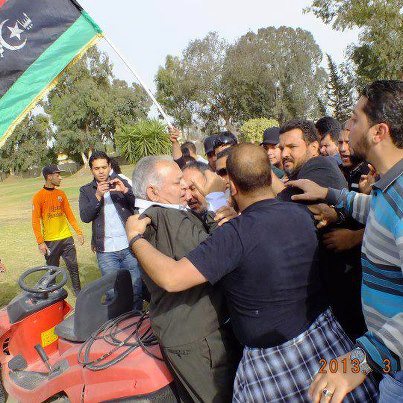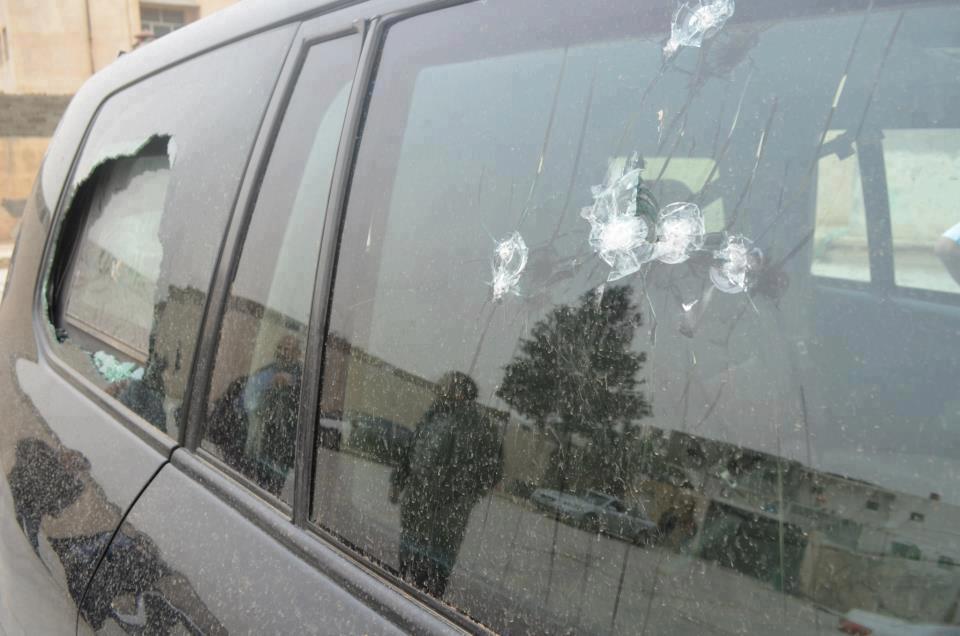By Sami Zaptia.
Tripoli, 6 March 2013:
In an extraordinary turn . . .[restrict]of events yesterday, Tuesday, even by Libya’s standards, a number of GNC (General National Council) members were held hostage for all of the day by armed demonstrators.
The protestors, put at between 500-600, tried to force the GNC members to pass the “Political Isolation” law that would ban those who held positions under the Qaddafi regime from holding office today. One member – Juma Sayah, an independent from Nasiriyah – was attacked and wounded in the incident.
The GNC had barely had time to celebrate the fact that its original building had at long last been vacated yesterday from its occupation by war amputees. This had occurred yesterday by peaceful mediation after an earlier failed attempt by the government to vacate the building by use of force.
The building housing the GNC, a conference centre next to the Rixos hotel, was damaged by the amputees during the attempted storming by government forces. The government forces were ordered to retreat to avoid bloodshed when the amputees fired at them.
Protestors had yesterday been encouraged to turn up outside the Congress by a campaign on Facebook supporting the political isolation law. Aware that many hundreds, possibly thousands, would picket the session, and because of the damage to the building, Congress members decided at the last minute to meet at a different location — at the Meteorological institute in Crimea district south of Tripoli. However, the change of venue was leaked to the protestors, allegedly by sympathisers in Congress.
The demonstrating crowd surrounded the building and refused to allow the GNC members out until they passed the Political Isolation Law.
Debate over this law is polarised and highly politicised with those who took part in the 17th February Revolution being the most supportive of it. They want no exceptions from this law and have set the bar very high.
If the law is passed as it stands, every top official, from NTC head Mustafa Abdul Jalil, to GNC head Mohamed Magarief, Prime Minister Ali Zeidan, NFA Party leader Mahmoud Jibril and most ministers and government officials – would all be barred from holding any high office. At least 30 members of Congress would be disbarred as well.
Some see the proposed law as political score settling by some members of the GNC against others.
The crowds refused to even allow food to be taken in or to make allowance for women GNC members. Juma Sayah attempted to leave the building by climbing over a wall, but the demonstrating mob forced him back into the building. He was seen on TV being hit repeatedly on the head by demonstrators.
Congress members caught up in the attack, who included Congress President Mohamed Magarief, refused to be coerced into passing the law. In any event, there were not enough members present at the Meteorological Institute when the protestors arrived at about noon to constitute a quorum. It is reported that there were just 26 present. They were not released till late in the evening.
Organisers of the protest have accused unnamed troublemakers of infiltrating it to destabilize the political climate. They also blame a lack of sufficient security for the meeting.
“There was no security,” said Union for Homeland leader Abdulrahman Sewehli, adding that his son had had to protect Magarief from protestors. This evening, responding to accusations that he was in part responsible for the incident, he both denied it and condemned the attempt to coerce Congress into passing the law by threats.
The attack has been condemned by UN and foreign governments, including the UK and France. The United Nations Support Mission in Libya (UNSMIL) said that while peaceful protest was a fundamental right for Libyans, it was extremely concerned about the attempt to coerce Congress. The British and French governments also put out similar statements expressing deep concern.
Congress leader Magarief has said that it will not “engage in work at gunpoint”. Describing those involved as “anarchists”, he said that there were legitimate ways to protest but not by physical abuse and holding members of Congress hostage. He said that he had himself been physically threatened but had dealt with the protestors. He called on Libyans to rally in support of the country’s legitimate institutions. [/restrict]










